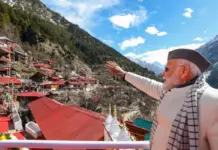Uttarakhand High court dismissed two writ petitions. This includes one petition by BJP Rajya Sabha MP Subramanian Swamy. Swamy challenge the constitutional validity of Char Dham management Act 2019.
The Act brought 51 Mandir in the state which also includes the Char Dham Shrines, under the control of state government.
The bench of Chief Justice Ramesh Ranganathan and Justice Ramesh Chandra khulbe stated that the act does not violate right to equality and religious freedom.
The petitioners had challenge the act passed by government.
The Act argues that the constitutional guarantees of devotees and priests the right to manage their own affairs .
Swamy petition held that the Act violates Article 14 , 24, 26, and also 31-A.

The Act, which brings the Char Dham of Badrinath, Kedarnath, Gangotri and Yamunotri and many other temples under the purview of the Uttarakhand Char Dham Devasthanam Board, has faced protest from the Congress as well as from priests and pandas of the Badrinath shrine, who had earlier staged demonstrations in Dehradun and other districts.

While dismissing the PIL, said, “Except to the limited extent that the words ‘shall devolve’ in Section 22 must be read as ‘devolve on the Char Dham and shall be maintained by the Board’, and the words ‘may further acquire land’, in the proviso thereto, shall be read as ‘may further acquire land on behalf of the Char Dham’, the challenge to the validity of the 2019 Act, on the ground that it violates Articles 14, 25, 26 and 31-A of the Constitution of India, must fail.”
“We are satisfied, therefore, that all the Char Dham and associated temples are public temples whose secular functions can be regulated by a law made by the competent legislature,” the court said .
While the Chief Minister of Uttarakhand Trivendra Singh Rawat welcomed the judgment and said the constitution of the board was not a political matter. However, Swamy indicated he will appeal the matter in the Supreme Court.





